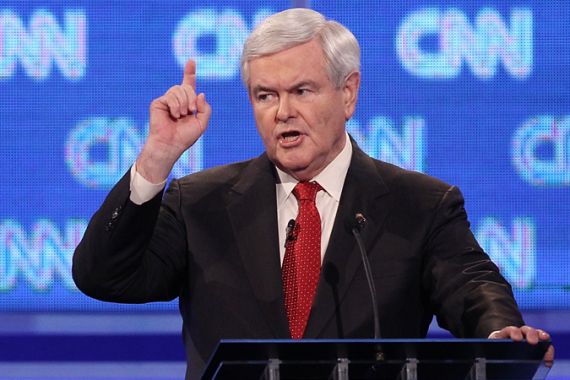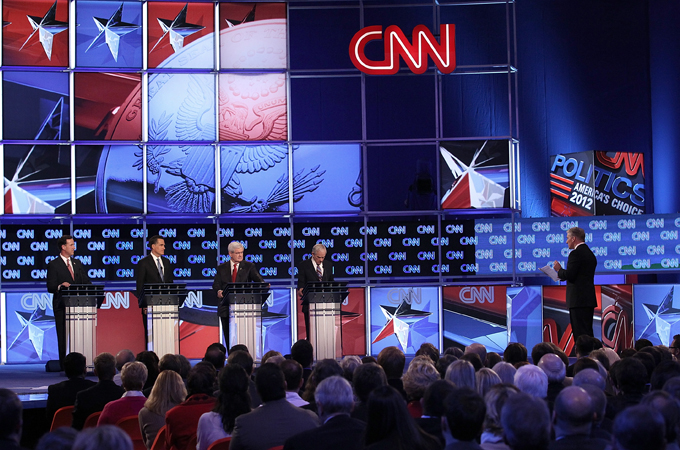How Gingrich garnered South Carolina support
Newt Gingrich played to the crowd and used their cynicism of the media to his advantage in the SC Republican debates.

 |
| During the South Carolina debates, Gingrich took advantage of poor public confidence in the media [GALLO/GETTY] |
New York, NY – As the Republican primary circus moves South, the media focus remains on the candidates – when it should be on the media itself.
That’s because we live in a mediaocracy – not a democracy. Without the media, we could not have elections. TV news is now the main source of political news and opinion. It gives short shrift to critics and alternative views. The networks frame the issues, fuel the partisan divide and help set the agenda.
In the old days, politicians took trains across the US to speak to the people. Today, they travel to TV studios or set up events designed for media coverage, often by former TV producers and consultants.
| Gingrich takes offence at US media charges |
We live with the illusion that politics is all about elections and the front men who are running or debating. Those in the US who really still believe that our democracy is run on a “of the people, by the people and for the people” foundation barely recognise that many decisions are made behind the scenes by political donors and lobbyists. What they know comes from what the media decides to cover and not cover.
The assumption is that the media is neutral, they’re just to show us what’s happening. Unrecognised is that they are in a race too, for ratings, revenues and recognition. The TV reporters and pundits who get far more “face time” than the politicians are political to the core, as interested in promotion and attention as the people they cover.
Becoming the issue
The media itself is usually able to remain above the fray and determine what issues to validate and which to ignore. But, sometimes, they become the issue, and that’s what happened in South Carolina.
The voters there who backed Newt Gingrich – whose popularity surged in the final days of the primary ritual – were voting on the media, which is how Gingrich cleverly framed the issue.
It wasn’t about what he stood for – a changing set of positions – but who had embarrassed him. The South, known for its manners, shouted back on his behalf with its ballots.
Playing to an audience of Fox News think-alikes and rightwing radio aficionados who had been pounded with the failures of the “liberal media” for years, voters there were ready to buy Gingrich’s posturing as a victim of media abuse.
For a minute, they could forget issues that evangelicals say really trouble them – immorality in marriage and Catholicism – to send a message to the media by voting Newt.
They hate the media as much as they hate Obama.
Former Washington Post and CNN/Daily Beast commentator Howard Kurtz was one of the few pundits to recognise that Gingrich successfully turned a major media assault on him back on to the media in his first response to a question from his colleague John King on his treatment of his ex-wives.
“Newt Gingrich probably won the debate in those opening moments,” Kurtz said. “And I must say that I thought it was a misstep for (CNN’s) John King, who is a fair and seasoned and balanced reporter, to make that the very first question of the debate.”
“Everything that happened after that, even when Mitt Romney stumbled about his tax return, was indeed an afterthought,” he added.
Kurtz then described the interview that aired on ABC as something of “a late hit”, saying: “It does, I think in an unintentional way, create sympathy for Newt Gingrich.”
| Inside Story US 2012 – Showdown in South Carolina |
Sure it did, because Gingrich understood what the media mavens do not – how much they are detested.
Master of media
He has been around media for decades, and is now in the media business with a company that makes “documentaries”. He knows how it works – and doesn’t work. (And so does Stephen Colbert, another media personality now playing at politics. His entry into the race is a sign of the way the boundary between news and entertainment has fallen.)
Most of the media sees the campaign only in partisan terms when they see it at all, and so try to pose at being fair and balanced, a phrase that Fox seized on when it started its “news” – actually “views” – network.
But viewers, in survey after survey, express dissatisfaction with big media companies that they then, paradoxically, perhaps out of habit and conditioning, rely on for their news and information – even as a growing number have turned to the online world in search of truth.
They watch, but they are not necessarily being informed. A Pew Research study in January found, after months of endless political coverage: “Many voters do not know basic facts about the Republican candidates running for president or the early primary calendar. While a sizeable majority (69 per cent) knows that Newt Gingrich served as speaker of the House, only about half (53 per cent) identify Massachusetts as the state where Mitt Romney served as governor.”
|
“Many voters do not know basic facts about the Republican candidates running for president or the early primary calendar.“ – Pew Research study |
The public is aware that the political ads they are watching are designed to manipulate them, but not necessarily because TV news exposes them. Remember, even as some news shows may critique the ads, most networks carry them as paid advertising. Few are ever rejected for being inaccurate.
Pew reports: “Fully 65 per cent of those who are aware of the new rules on independent expenditures say they are having a negative effect on the 2012 presidential campaign. And among those who have heard a lot about these new campaign finance rules, 78 per cent say the effect has been negative.”
It was a comedy show – The Colbert Report – that drew the most attention to the pernicious role of money in politics and of SuperPACs, not TV news programmes.
Drops in confidence
| Gingrich wins South Carolina primary |
There have been academic studies rarely reported on TV news “shows” that report that public confidence in the media has dropped, alongside confidence in political and social institutions. Much of the anger of activists in disparate movements such as Occupy Wall Street and even the Tea Party grow out of a sense that our system is “broken”.
As one study put it: “Healthy scepticism may have given way to corrosive cynicism.” Trust in government and media is at a new low.
We saw this recently with the internet strike against the online piracy legislation supported by all the media companies. The opposition went across the spectrum and the original bill was withdrawn.
An earlier survey by the Consumer Federation found, “by a wide margin (70 per cent vs 30 per cent), survey respondents believe that media companies are becoming too large. This concern reflects their belief that mergers between media companies do not lead to better content and services.”
Issues about the power and negative impact of the media are rarely reported in the media – except to make some partisan point about political personalities. The financial interests of the media companies are rarely in the news.
And voters are rarely given a chance to express their views on how the media damages our democracy, as opposed to building respect for it or encouraging involvement in strengthening it.
Many did perceive they had such a chance in South Carolina and they voted against the media, but in doing so, chose a politician well known as a “media darling” (there is another, less salubrious, term for this with which you may be familiar).
He must be ecstatic, and thanking CNN for saving his political hide.
Danny Schechter writes the NewsDissector.com blog. His latest book is Occupy: Dissecting Occupy Wall Street. His latest film is Plunder: The crime of our time. Comments to dissector@Mediachannel.org
Follow him on Twitter: @dissectorevents
The views expressed in this article are the author’s own and do not necessarily reflect Al Jazeera’s editorial policy.
